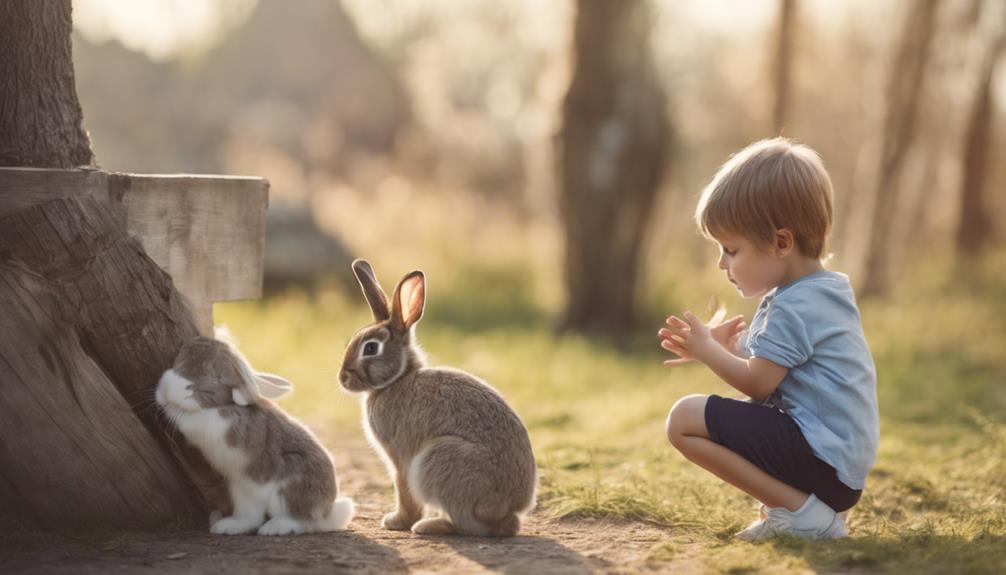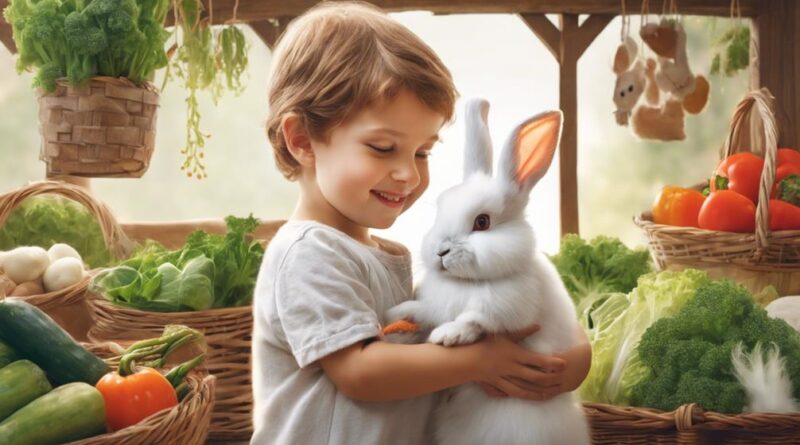What Should Kids Know About Caring for Rabbits?
To care for rabbits, kids should prioritize providing proper housing, nutrition, and social interaction. Remember, rabbits have high fiber dietary needs, like hay and fresh veggies. Bond by handling them gently, spending quality time daily, and offering treats. It's crucial to brush them regularly, check for signs of illness, and create safe spaces for them to explore. Teaching responsibility through rabbit care can help kids develop empathy and time management skills. By ensuring the well-being of these adorable pets, kids can form a rewarding bond and learn valuable life lessons. Learn more about caring for rabbits for a fulfilling pet ownership experience.
Benefits of Having a Pet Rabbit
Having a pet rabbit can bring joy and companionship into your life while also teaching you responsibility and empathy. Rabbit companionship has been linked to improved mental health. The gentle nature of rabbits can provide comfort and reduce feelings of loneliness and anxiety. Caring for a rabbit can give you a sense of purpose and help you develop a nurturing attitude towards others.
In addition to the emotional benefits, rabbits require regular exercise to stay healthy. Providing a safe space for your rabbit to hop and play indoors is essential for their physical well-being. Indoor playtime is crucial for rabbits as they need mental stimulation and physical activity to prevent boredom and obesity. Interacting with your rabbit during playtime can strengthen the bond between you and your pet while also promoting their overall health.
Choosing the Right Rabbit Breed
When selecting the right rabbit breed, consider factors such as size, temperament, and care requirements to ensure a good match for your lifestyle and living situation. Rabbit personality traits vary among breeds, so understanding these characteristics can help you choose the most suitable rabbit for you. Some breeds are more energetic and playful, while others are calmer and enjoy cuddling. Think about what type of rabbit personality would best fit into your family dynamic.
Another crucial aspect to consider when choosing a rabbit breed is the suitable rabbit environments. Different breeds have varying needs when it comes to living spaces. For example, larger breeds like the Flemish Giant require more room to hop around and stretch out compared to smaller breeds like the Netherland Dwarf, which can thrive in smaller living spaces. Additionally, some rabbits have specific grooming requirements due to their fur types, so make sure you're prepared to provide the necessary care.
Basic Rabbit Housing Needs
Consider how the size and temperament of your chosen rabbit breed will influence the basic housing needs you'll need to provide for your new furry companion. When deciding between outdoor vs. indoor housing, it's crucial to ensure your rabbit's safety and comfort. Indoor housing is ideal for smaller breeds or those with more docile temperaments, providing protection from predators, extreme weather, and ensuring closer interaction with the family. On the other hand, outdoor housing can be suitable for larger breeds or rabbits that enjoy more space and natural light, but precautions must be taken to secure the hutch or cage from potential threats.
When selecting between a hutch vs. cage, consider the space requirements and your rabbit's habits. A hutch is a larger, enclosed area that allows for more freedom of movement and can accommodate accessories like ramps and hiding spots. It's perfect for rabbits that need space to exercise and explore. Conversely, a cage is a more confined space that provides security and easy visibility of your pet. Some rabbits may prefer the coziness of a cage, especially if they're smaller breeds or feel overwhelmed in larger areas.
Ultimately, the key is to match the housing choice with your rabbit's needs and preferences to ensure a happy and healthy living environment.
Importance of Proper Nutrition
Proper nutrition plays a vital role in maintaining the health and well-being of your rabbit. Ensuring that your rabbit receives the correct dietary requirements and follows a consistent feeding schedule is crucial for their overall health. Here are some key points to consider regarding the importance of proper nutrition for your furry friend:
- Dietary Requirements: Rabbits have specific dietary needs that must be met to keep them healthy. A diet high in fiber is essential for their digestive health, as rabbits' digestive systems require a constant influx of fiber to function properly.
- Feeding Schedule: Establishing a consistent feeding schedule is important for your rabbit's well-being. Regular feeding times help regulate their digestive system and prevent any potential issues that may arise from irregular eating habits.
- Nutritional Supplements and Fresh Vegetables: In addition to hay and pellets, providing your rabbit with nutritional supplements and fresh vegetables can help ensure they're getting all the essential vitamins and minerals they need. Fresh vegetables like leafy greens and carrots aren't only nutritious but also help keep your rabbit's teeth healthy and worn down.
Handling and Socializing With Rabbits
Maintaining a healthy relationship with your rabbit involves understanding how to properly handle and socialize with them. When handling your rabbit, it's crucial to support their hind legs to prevent injuries as they've a delicate skeletal structure. Make sure to approach them calmly and confidently, avoiding sudden movements that might startle them.
Socializing with your rabbit is essential for building trust and strengthening your bond. Spend quality time with your rabbit every day to help them feel comfortable around you.
Bonding techniques are vital for creating a strong connection with your rabbit. Sit near their enclosure and speak to them softly to get them accustomed to your presence. Offering treats from your hand can also help them associate you with positive experiences. Additionally, engaging in playtime activities is a fun way to interact with your rabbit. Provide them with toys like tunnels, balls, or cardboard boxes to keep them entertained and mentally stimulated.
Remember that each rabbit has its own personality, so be patient and understanding as you build your relationship. Respect their boundaries and always observe their body language for signs of discomfort. By following these handling and socializing tips, you'll foster a happy and trusting relationship with your rabbit.
Health and Grooming Essentials
Regular grooming and monitoring of your rabbit's health are essential for their well-being and happiness. To ensure your furry friend stays healthy and happy, here are some key health and grooming essentials to keep in mind:
- Grooming Techniques:
Brushing your rabbit's fur regularly helps prevent mats and keeps their coat in good condition. Long-haired rabbits may need more frequent grooming to prevent tangles and matting. Additionally, trimming their nails is crucial to prevent overgrowth and discomfort.
- Health Tips:
Regularly check your rabbit for any signs of illness, such as changes in appetite, behavior, or bathroom habits. If you notice anything unusual, consult a veterinarian promptly. Providing a balanced diet rich in hay, fresh vegetables, and limited pellets is essential for their overall health and well-being.
- Parasite Prevention and Dental Care:
Protect your rabbit from parasites like fleas and mites by keeping their living area clean and using vet-approved preventive treatments. Dental care is also vital for rabbits, as their teeth continuously grow. Providing chew toys and regular vet check-ups can help prevent dental issues.
Understanding Rabbit Behavior

To better care for your rabbit, understanding their behavior is key to fostering a strong bond and ensuring their well-being. Rabbits communicate through various cues, such as body language, vocalizations, and actions. Learning to interpret these signals can help you understand your rabbit's needs and emotions. For example, thumping their hind legs may indicate fear or annoyance, while gentle tooth-clicking can signal contentment.
Behavioral enrichment is crucial to keep your rabbit mentally stimulated and physically active. Providing toys like tunnels, cardboard boxes, or wooden chew toys can prevent boredom and encourage natural behaviors like digging and chewing. Additionally, creating safe spaces for your rabbit to explore, such as rabbit-proofed rooms or enclosed outdoor runs, can offer new experiences and prevent stress.
Social interaction is essential for rabbits, as they're social animals that thrive on companionship. If possible, consider getting your rabbit a bonded partner to prevent loneliness. However, introductions should be gradual and supervised to ensure the rabbits get along.
Teaching Responsibility Through Rabbit Care
Teaching children responsibility through the care of rabbits can instill valuable life lessons about commitment and compassion. Rabbits require daily care and attention, creating a perfect opportunity for kids to learn essential skills that will benefit them throughout their lives.
- Time Management: Caring for a rabbit involves a daily routine of feeding, cleaning, and exercising the pet. By learning to prioritize these tasks, children can develop time management skills that are crucial for success in school and future careers.
- Accountability Training: Owning a rabbit teaches kids to be accountable for another living being. They must ensure the rabbit has a clean living environment, fresh water, and a balanced diet. This accountability fosters a sense of responsibility and empathy in children.
- Commitment Building: Rabbits can live for several years, requiring a long-term commitment from their owners. This extended responsibility helps children understand the importance of sticking with their commitments, even when challenges arise.
Through the daily care of rabbits, children not only bond with their pets but also learn fundamental values like time management, accountability, and commitment. These lessons can shape them into responsible and empathetic individuals, preparing them for the challenges and rewards of adulthood.
Frequently Asked Questions
Can Rabbits Be Potty-Trained Like Cats or Dogs?
Yes, rabbits can be potty-trained like cats or dogs. Litter training is key to teaching them good indoor habits.
How Often Should Rabbits Visit the Veterinarian?
You should take your rabbits for regular check-ups at the veterinarian to ensure they stay healthy.
Preventative care is important in keeping your furry friends happy and thriving.
Visiting the vet allows for early detection of any issues and helps in maintaining your rabbits' well-being.
Are There Any Specific Toys Rabbits Enjoy Playing With?
Rabbits thrive on enrichment activities and interactive play. They enjoy DIY toys like cardboard tubes and chew treats to keep them entertained. Providing toys for mental stimulation is essential for their well-being.
Interactive play helps build a bond between you and your pet rabbit. Engage them with toys that encourage natural behaviors like digging and chewing. Remember, a happy and stimulated rabbit is a healthy one!
What Are Some Common Behavioral Problems in Pet Rabbits?
When it comes to pet rabbits, common behavioral problems can include aggression issues and signs of boredom. To address aggression, positive reinforcement training methods can be beneficial.
Signs of boredom like excessive chewing or digging can be alleviated through enrichment activities and toys. Additionally, bonding techniques such as spending quality time with your rabbit and providing mental stimulation can help foster a strong human-rabbit relationship.
Is It Safe for Rabbits to Roam Outdoors in the Yard?
When it comes to letting your rabbits roam outdoors in the yard, there are outdoor dangers to consider. Supervised playtime is crucial to ensure their safety.
Keep an eye out for predators, toxic plants, extreme temperatures, and escape routes. Always provide a secure and rabbit-proofed area for them to explore while outdoors.
Conclusion
Overall, caring for a rabbit can be a rewarding experience for kids. By providing proper housing, nutrition, and attention, children can learn valuable lessons in responsibility and compassion.
Understanding rabbit behavior and health needs is essential to ensure a happy and healthy pet. By taking the time to socialize and bond with their rabbit, kids can form a special connection with their furry friend.
Remember, caring for a rabbit is a big responsibility, but the rewards are well worth it.
